Intense Isolation
senior spends past year carefully quarantining

While most have done their share to stop the spread of COVID-19 by following health precautions, senior Dori Jezmir has taken extreme cautions because her parents are high-risk.
“My dad is 68 and my mom is 60,” Jezmir said. “My mom was diagnosed with skin cancer last year and she has high blood pressure. My dad has something [undiagnosed], but he has dizzy spells where he loses consciousness.”
Isolation comes with a wide array of effects on Jezmir’s relationship with her family, one being a lack of privacy.
“The walls are really thin at my house, so we hear every conversation — there’s no way out,” Jezmir said. “It’s a bit overwhelming.”
Without being able to venture out, the Jezmir family has bonded.
“We have family nights,” Jezmir said. “We eat dinner together every day. We update each other [about] our own things going on.”
Outside of family, Jezmir involves herself with clubs that meet online, as well as stage managing BV productions when she’s able to be in-person. Prior to being vaccinated, Jezmir wore three masks and a shield to protect herself and her family.
“I had to sit super far away from everybody,” Jezmir said. “It is very hard to breathe with three masks and the shield — you’re just breathing in heat.”
Jezmir’s stage-managing has been her only connection to BV, and because the online program is “limited,” she only takes three virtual classes.
Isolation also took away a crucial educational opportunity for Jezmir: the ACT. She was only able to take the test once when it was offered in school.
“My parents didn’t feel comfortable with me going into [test centers], which gave me a disadvantage on my college applications,” Jezmir said. “I took it
for granted that the school gave me an ACT — I didn’t think I would not be able to take it again.”
Jezmir’s social life was also impacted, as some of her friends seem frustrated with her inability to spend time together.
“My close friends were like, ‘We understand,’ but the longer into corona we got, the more irritated a lot of them have gotten,” Jezmir said. “I guess [they’re] missing me in a way, but [you’ve] got to be understanding that I’m not doing this for selfish reasons. I’m doing this for the exact opposite.”
On rare occasions when Jezmir joins her friends, conditions aren’t ideal.
“I wear a mask, even if I’m outside,” Jezmir said. “It’s not even six feet apart — it’s across the street.”
Even so, Jezmir’s friends are excited to see her again.
“When I posted [that] I got my second vaccine, I had people saying, ‘Does that mean you can hang out now?’, which is really sweet,” she said.
Although seniors lost many exciting activities this year, Jezmir’s situation left fun opportunities more limited.
“People still had their own parties and hangouts and I didn’t go to anything like that, even going to school,” she said. “Everyone goes out. Everyone goes to school.”
Jezmir believes her parents have misconceptions about how other students are handling isolation.
“My parents [say], ‘Everyone is this isolated,’ and I don’t think that’s the case,” Jezmir said. “I don’t think they see how teenagers need to go and interact with other people, as we’re growing minds. That’s not their fault. They have a closed mindset about how the world actually is these days.”
Jezmir feels a return to normalcy will be harder for her than others.
“I was someone that went out a lot before corona,” Jezmir said. “I will start feeling more normal when I move out and go to college, but it will be a bit weird for me to do things. I’ll have to progressively get back to normal, whereas others are already at their normal stage. It’s going to be a slow process.”
Despite the difficulty of quarantine, Jezmir has no regrets.
“It’s a sacrifice I was willing to make — I don’t know what I would have done if my parents got sick,” Jezmir said. “It would be the scariest thing that could have happened.”

Stephanie Kontopanos is a senior and the assistant editor of The Tiger Print. This is her third year on staff and her second year being the Newspaper Grandma...



